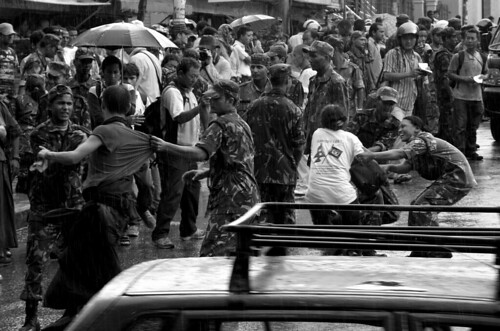The Himalayan nation is not getting a break, it seems. Nepal's list of woes is getting longer by the day. After dispute regarding Pashupatinath Temple, Nepal Army's recruitment drive and the lack of interest among leaders in working out a new constitution, the country is now hit by A series of violent protests. Add to this the 16-hour long daily power cuts.
Last week Tibetan refugees in Nepal staged protest against the Chinese government on the 50th anniversary of the Tibet uprising. Three foreigners – Dutch, British and Norwegian national were detained during the protest. Although Nepal for long has supported the one China policy, frequent protests by the refugees and the scene of scuffle with the protesters played in the world media have hit the country's image.

Demo of Tibet refugees in front of the Chinese Embassy on October 12, 2008. Photo by Mafate69 and used under a creative commons license.
Red Room posts an interview of a Tibetan refugee conducted by Andrew Q Lam. It provides a refugee's perspective on their life in Nepal and what they feel about Tibet, a break from usual war of words between the Chinese side and those sympathetic to Tibet.
“In 1961, when I was eight years old, we fled to Nepal when the Chinese forced us out of our homes. They wanted us to study to become good communists and arrested all our lamas so we couldn't stay.
We had 14 people in our families and we lived like animals the first three years — we depended completely on the international charities to feed us. But then my sisters and I learned to weave carpets, and we began to support ourselves and our family.
In Nepal we have no citizenship. After almost 40 years, we still cannot own land. We can only rent or live in a Tibetan camp.
Now I have my own antique store here, but it's not possible to own it.”
Tharus, an ethnic minority group clustered in Nepal's southern plains also took to the streets for two weeks demanding that they should not be classified as the more dominant Madhesi group and be given priority in public sector jobs.
Voice of Tharus, has posted a Nepali opinion piece on the Tharu agitation by Kishore Nepal, which says:
“In the changing times, we can survive as a nation only when we can include different opinions and views within the common identity of Nepal. We do not need common cultural base for this but have to work to establish autonomous region where Tharus and Madhesis, and other ethnic groups can live can live as one and many.”
Like Tharus, Muslims as also a minority group in Nepal. Last week they too took to the streets demanding separate ethnic group status and priority in public sector jobs:
“The minority Muslim community in Nepal today threatened to enforce a general strike in the capital if the Maoist-led government fails to recognize them as a separate ethnic group in the Terai plains.
The threat from the Muslims will add to the ethnic unrest in the country over greater political and economic rights. The community announced agitation next week against the governments categorization in the new constitution, which includes them in the list of the Madhesis community living in the Terai plains bordering India.”
In a late breaking news from Nepal, talks between the Muslim leadership and the government have ended, according to Kantipur. The dialog is described as being positive, government has pledged to address their demands but details are yet to be worked out. But nothing these days is straightforward in Nepal. In a bizarre twist the moment the talks had ended, a group of Muslims claimed that the team lead by United Muslim National Struggle Committee does not represent the community and demanded that government address their demands (submitted on February 25th) first.






